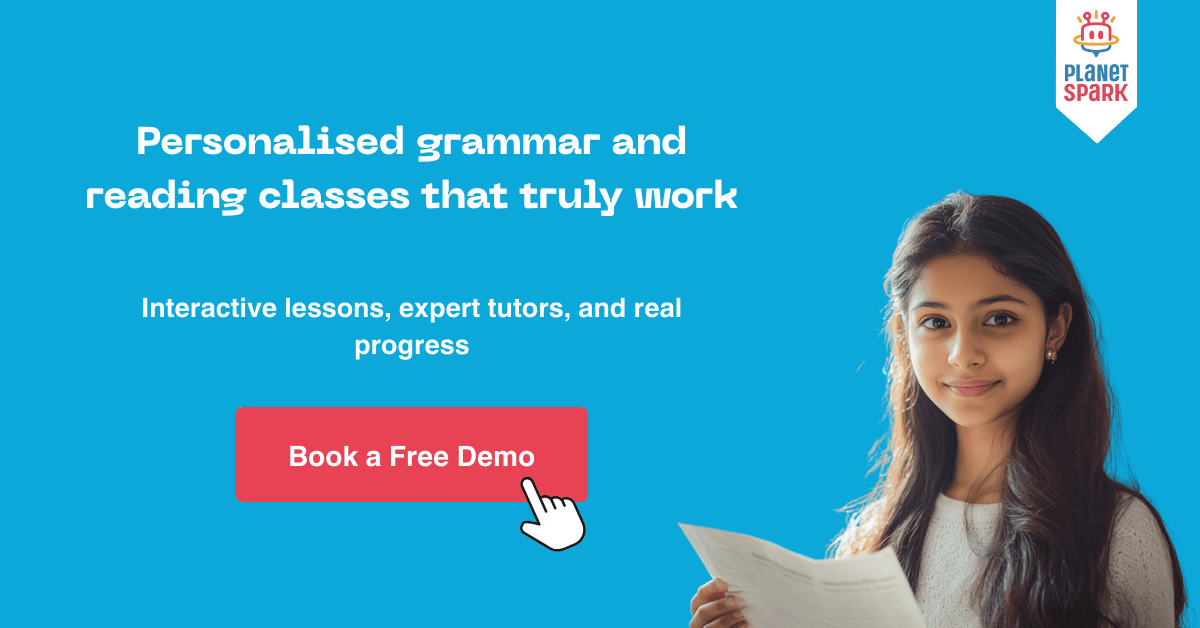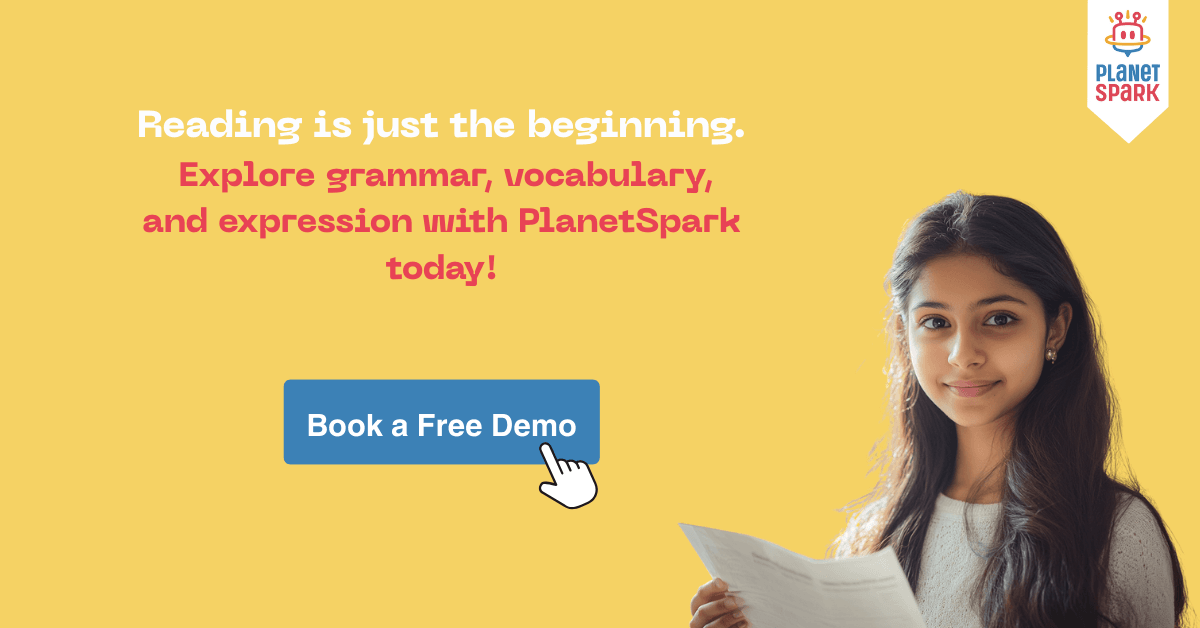English Grammar Conjunction for Class 7
Last Updated At: 12 Aug 2025
9 min read

Table of Contents
- What are Conjunctions for Class 7?
- Kinds of Conjunctions
- Common Conjunctions List for Class 7 Students
- How to Use Conjunctions Properly?
- Quick Exercises
- Tips for Parents: Helping Your Child Master Conjunctions
- Conjunctions vs. Prepositions – What’s the Difference?
- About PlanetSpark
- Frequently Asked Questions (FAQs)
This blog is a complete guide to conjunctions for Class 7 students. It explains what conjunctions are, the different types, how to use them correctly, and common examples students encounter in schoolwork. You’ll also find practice exercises, tips for parents, and a quick comparison between conjunctions and prepositions to help learners avoid confusion. Whether your child needs help with grammar basics or wants to excel in English writing, this guide provides clear explanations and engaging activities to make learning conjunctions fun and effective.
What are Conjunctions for Class 7?
Conjunctions are words that join words, phrases, or clauses in a sentence. Common conjunctions include “and,” “but,” and “or.” They help form compound and complex sentences by linking ideas logically. Class 7 students use conjunctions to improve sentence fluency and connect thoughts more clearly in writing.
Students need to know about the various types of conjunctions and how to use them in daily conversations and writing. They must also learn how to use them in their written work. This article will focus on the basic conjunctions for class 7 and how they are used in sentences.
Examples:
Meeta likes pizza and pastries.
Is she her friend or not?
Kavish is playing, but Khushi is studying.
Everyone hates Priya because she is rude.
The highlighted words – ‘and’, ‘or’, ‘but’ and ‘because’ – are conjunctions. They join two sentences, phrases, or clauses, and are known as joining words.

Kinds of Conjunctions
Conjunctions are of three kinds:
Coordinating Conjunctions
Subordinating Conjunctions
Correlative Conjunctions
1. Coordinating Conjunctions
Coordinating conjunctions join words or groups of words of equal importance in the sentence.
Example:
In the sentence, ‘We will have to leave early, but we will be back in time for lunch’, ‘but’ is a coordinating conjunction that joins clauses of equal importance.
Other coordinating conjunctions: and, but, or, not, for, yet, so.
More examples:
He was late for the class, yet the teacher didn’t scold him.
Sheena likes singing and dancing.
Rahul likes cooking, but Preeti hates cooking.
No one was in Jaipur, so I attended the event.
2. Subordinating Conjunctions
These conjunctions connect groups of words of varying importance, making one portion of the sentence dependent on another.
Example:
In the sentence, ‘Despite Riya’s best efforts, she could not pass the exam’, ‘despite’ is the subordinating conjunction that makes one phrase dependent on another.
Other subordinating conjunctions: after, if, although, if only, till, so that.
More examples:
I will do the homework after I complete my lunch.
If you create a caloric deficit, you will lose weight.
Though he’s late to the class, he’s doing well.
Even though she studied hard, she failed her class.
Although people try a lot, they can still make mistakes.
3. Correlative Conjunctions
These conjunctions work in pairs to join words or groups of words having equal importance.
Example:
In the sentence, ‘Either we must leave early, or we must miss the plane’, ‘either...or’ is a correlative conjunction that joins clauses of equal importance.
Some correlative conjunctions: either/or, neither/nor, both/and, whether/or, not only/but also.
More examples:
Either Riya or Ryan has taken the apple.
Priya has decided that she’ll neither go to Paris nor America.
Mothers are both loving and caring.
She is not only a liar but a cheater as well.
Common Conjunctions List for Class 7 Students
| Coordinating | Subordinating | Correlative |
|---|---|---|
| and | after | either...or |
| but | although | neither...nor |
| or | because | both...and |
| nor | before | not only...but also |
| so | if | whether...or |
| yet | since | as much...as |
| for | though | as...as |
| unless | the more...the more | |
| while | hardly...when |
How to Use Conjunctions Properly?
Here are a few simple tricks to help you properly use conjunctions for Class 7:
You can use them at the beginning of a sentence.
Avoid a comma while joining two dependent phrases through a coordinating clause.
Example:
Incorrect – She took the utensils, and food from the kitchen.
Correct – She took the utensils and food from the kitchen.
Use a comma while joining two independent clauses with conjunctions.
Example:
Incorrect – She took the utensils and food from a cafe in the kitchen.
Correct – She took the utensils from the kitchen, and food from a cafe.
For subordinating clauses like because, if, although, since:
If the dependent clause opens the sentence, use a comma after it.
If the main clause opens the sentence, there is no need for a comma.
Example:
Because he woke up late this morning, he went to the office without eating anything.
He went to the office without eating anything because he woke up late in the morning.
Quick Exercises
Fill in the blanks with the correct conjunction:
Roota was ill ___________ she didn’t go to work. (so, because, as)
You should get your driving license ____ you have to pay a fine. (or, nor, but)
She didn’t place the order _____ there was no recurring demand for it. (as, since, either)
My grandmother has never been to America; ____ does she want to go. (neither, nor, either)
I am very exhausted ______ I have been playing all day. (so, because, therefore)
She took us to the play zone ____ she also took us to McDonald's. (but, but also, also)
________ it was freezing, we still went out. (though, even though, even)
Raman wasn’t terrified, ____ he was a little shocked. (if, but, although)
Taj Mahal is a historic site ____ is made up of white marble. (and, also, but)
You will get there ________ we do. (as, as soon as, soon)
Answers
Roota was ill, so she didn’t go to work.
You should get your driving license, or you have to pay a fine.
She didn’t place the order as there was no recurring demand for it.
My grandmother has never been to America; neither does she want to go.
I am exhausted as I have been playing all day.
She not only took us to the play zone, but she also took us to McDonald's.
Even though it was freezing, we still went out.
Raman wasn’t terrified, but he was a little shocked.
Taj Mahal is a historic site and is made up of white marble.
You will get there as soon as we do.
Tips for Parents: Helping Your Child Master Conjunctions
Use storytelling: Encourage your child to tell a story using 5 different conjunctions.
Play games: Use flashcards with different conjunctions and challenge your child to make a sentence for each.
Interactive worksheets: Download or create fill-in-the-blank worksheets.
Speak in pairs: Practice with sentence halves and ask your child to complete them using conjunctions.
Use media: Watch English cartoons or shows and ask your child to spot conjunctions being used.

Conjunctions vs. Prepositions – What’s the Difference?
| Feature | Conjunction | Preposition |
|---|---|---|
| Function | Joins clauses or sentences | Shows relationship with a noun |
| Example | I want to go, but it’s raining. | The book is on the table. |
| Used for | Linking ideas | Showing position, direction, etc. |
About PlanetSpark
English is a vast language, and getting familiar with all the rules might overwhelm your child. We, at PlanetSpark, are here to make the English learning process easier for your kids by providing free worksheets, lessons, programmes, and activities.
Apart from this, PlanetSpark aims to enhance your child’s overall personality through interactive sessions and activities to help your child be better and brighter than others.
With over 1 million sessions from 13 different countries, we provide our students with the best and most extensive knowledge.
We offer services like public speaking for kids, critical and creative thinking, extensive programs for reading and conversation skills, and spoken English.
Enroll today to help your child become their best version!
Frequently Asked Questions (FAQs)
Q1. What are conjunctions in English grammar for Class 7?
A: Conjunctions are words that connect two or more words, phrases, or clauses in a sentence. They help create smoother, more logical, and more complex sentences. Examples include: and, but, or, because.
Q2. Why are conjunctions important for Class 7 students?
A: Conjunctions help students express complex ideas clearly and connect thoughts in writing and speech. They are also crucial for constructing grammatically correct compound and complex sentences.
Q3. What are the 3 main types of conjunctions with examples?
A:
Coordinating conjunctions: Join equal parts (e.g., and, but, or).
Example: I want tea or coffee.Subordinating conjunctions: Link dependent clauses to main clauses (e.g., because, although, if).
Example: I stayed home because it was raining.Correlative conjunctions: Come in pairs (e.g., either…or, neither…nor).
Example: Either you study hard or you fail.
Q4. Can a sentence start with a conjunction?
A: Yes, a sentence can start with a conjunction like but, and, or because, especially in informal writing. However, it's best to use them carefully and not overuse them in formal essays.
Q5. What’s the difference between coordinating and subordinating conjunctions?
A:
Coordinating conjunctions connect ideas of equal importance.
Subordinating conjunctions connect a dependent idea to a main idea.
Example:
Coordinating: I like pizza, but I don’t like burgers.
Subordinating: I ate pizza because I was hungry.
Q6. How can I help my child remember conjunctions easily?
A: Use fun memory aids like the acronym FANBOYS for coordinating conjunctions: For, And, Nor, But, Or, Yet, So. Also, practicing with games, worksheets, and storytelling helps make learning interactive and effective.
Q7. Are conjunctions tested in school exams?
A: Yes, conjunctions are commonly tested in grammar sections of English exams in Class 7 through fill-in-the-blanks, sentence correction, and writing exercises.
Q8. What are some fun ways to practice conjunctions at home?
A: You can play games like “Conjunction Charades,” fill-in-the-blank worksheets, or story-building games where your child must connect sentences using different conjunctions.
Personalized Communication Report
Record a video to get a AI generated personalized communication report for your child
Select Learner's Class

Hi There, want to try these
tips for your child with
LIVE with our expert coach?
Let's check your child's
English fluency
